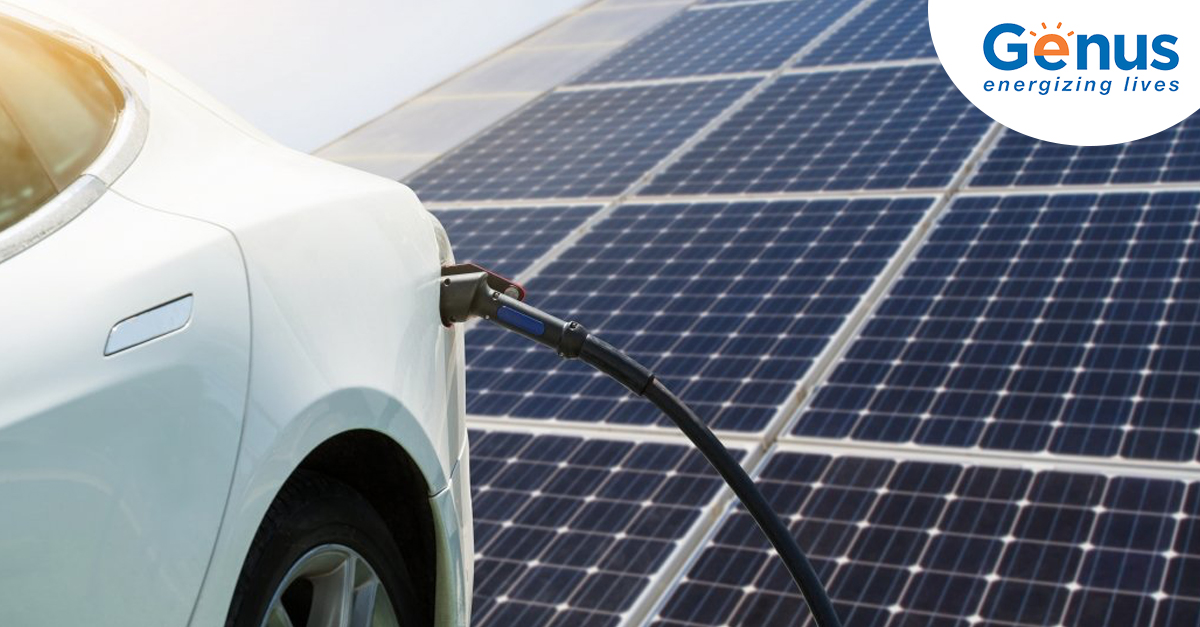
Solar charging stations for electric vehicles have emerged as one of the best ways to reduce India’s dependence on fossil fuels for powering various modes of transport. This is due to the fact that electric vehicles are generally powered by electricity produced by fossil fuels, which is a massive cause of concern.
As electric vehicles are getting more and more popular, it has become critical to implement solar charging for electric cars and bikes. Now, depending on the setup, there can be two types of solar charging stations for electric vehicles. To know all about these, read on.
Off-grid Solar Based Electric Vehicle Charging Station
In this setup, the charging station is not connected to local utilities. Therefore, it is also called EV autonomous charger. Here, the solar panel array feeds the battery storage system. Further, this battery storage system provides all the power needs of the charger.
Also Read: Your College Needs a Solar Charging Station – Here is Why
Since this type of charging station does not need a connection to the grid, it can be placed practically anywhere. Also, they are easy to install because most of them come with a solid steel foundation.
On-grid Solar Powered Charging Stations for Electric Vehicles
The cost of an on-grid solar EV charger is definitely less than the price of the off-grid version, because here, the energy generated by the solar array is stored in the grid rather than in batteries. When you feed the grid, the utility company gives you credits, which you can use to charge your EV. The energy that you do not use is sold to the utility company.
Also Read: Is the Solar-Powered E-Rickshaw Here to Stay?
Components Needed for a Solar EV Charging Station
- EV charger
- A solid foundation to seat a standalone solar charger
- Sufficiently intelligent software for billing and other functions
- Battery energy storage system (exclusively for solar energy charging stations that are off grid)
- Solar panel array for capturing the sun’s energy (installed on ground/roof)
How Many Solar Panels does It Take to Charge an Electric Car?
Now, can you charge an electric vehicle with solar? Generally, solar EV charging stations are best suited for “topping off” cars rather than charging them entirely, due to the time it takes to reach total capacity.
Also Read: Can You Charge An Electric Car With Solar Energy?
However, if you can keep your car in the same place long enough, you can charge it completely, but the time and number of solar panels it takes depend on how long you plan to drive.
To figure out how many solar panels you need for your solar EV charger, you need to identify how much you drive per day. Say you drive about 600 miles every month, which is about 20 miles per day. One of the more popular electric cars—the Tesla Model 3—requires around 26 kWh for every 100 miles it goes.
Now, consider you live in an area that receives direct sunlight for at least 5 hours per day, and you have a panel that turns out 1.5 kWh/ day, which means you need four solar panels of 290 watts each if you want to power your EV without help from the grid.
Also Read: Everything You Need to Know About Cars Powered by The Sun
Note: Make the calculation based on the car you drive. The following specs of top Indian electric cars will serve as a guide to what you may have to pay at a solar powered EV charging station in India along with the wait time.
Tata Nexon EV
- Battery capacity- 30.2kWh
- Distance/charge- 312 km
- Time taken for charging- 0-80% charge in 1hour
MG ZS EV
- Battery capacity-44.5kWh
- Distance/ charge-340km
- Time taken for charging-50 minutes for fast charging
Tata Tigor EV
- Battery capacity-21.5kWh
- Distance/ charge-142km
- Time taken for charging-90 minutes for fast charging
Conclusion
While electric vehicles (EVs) are a welcome change in India’s automotive landscape, most of the electricity used to power them comes from fossil fuels. Consequently, for ensuring a clean future, widespread adoption of solar chargers for EVs for both personal and commercial use is the need of the hour. Feel free to reach out to us if you have any queries or need a solar system that can provide your electric vehicle with sustainable and cost-effective power.
